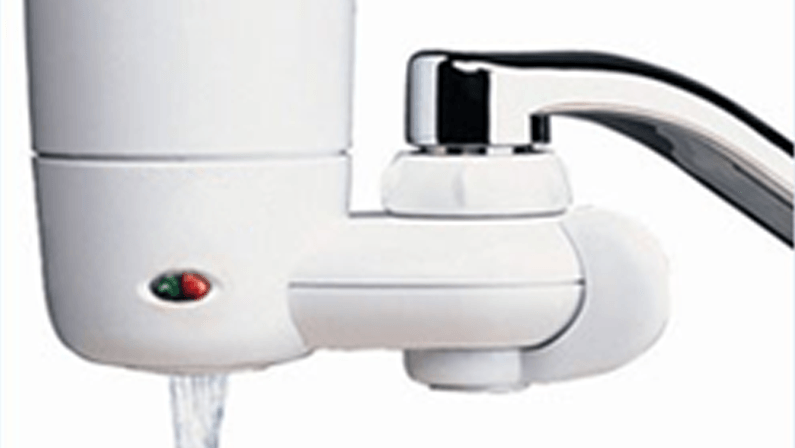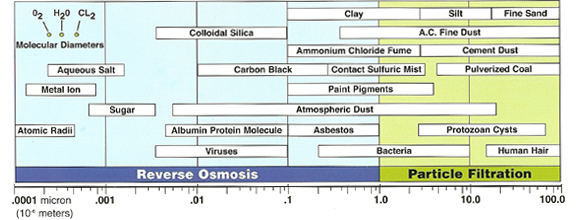Faucet Mount Filters – Do They Really Work?

Are you frustrated with your drinking water quality or ice?
Does your water taste “OK” at best?
Are your ice cubes cloudy, and do they leave “floaties” in the water when the ice melts?
If you’re using a Faucet Mount Water Filter, your water should be pretty good right?
In this article, we’ll take a look at what a “Faucet Filter” does, and doesn’t do. We’ll also compare these Faucet Water Filters to Reverse Osmosis Systems so you can see why we recommend them.
It’s a Filter, NOT a Purifier
Two of the most confusing aspects of drinking water systems are the terms “Filter” and “Purifier”.
These words are often used interchangeably, but in fact, they mean totally different things. It would be like calling every road-worthy vehicle a “truck”, when in fact you may be talking about a sports car or even a motorcycle!
Here’s how Brita describes their product:
In simplest terms: filters take out larger contaminants, purifiers take out everything else.
What Do Faucet Mount Filters Actually Do?
When you turn on your faucet, water first passes through a non-woven screen around the filter. This screen traps sediment like sand and dirt.
Next, the water flows through a compressed block of carbon and zeolite. Each little carbon granule has millions of little pores on the surface. These pores act like a sponge, and are great for removing chemicals like chlorine.
The slower that water flow through carbon, the more contact time carbon has with water, and the more chemicals can be removed.
“Purifiers” like Reverse Osmosis Systems use a combination of “dedicated” sediment filters, carbon filters, and membranes to remove a wide range of contaminants.
A complete RO System will not only take out chlorine, but also small Inorganics like Arsenic and salt.
For our residential customers, Premier Water typically uses a 50gpd (gallon per day) Reverse Osmosis System.
On the scale below, a Faucet Filter would be considered a “Particle Filter” – most likely removing contaminants over 5-10 microns in size. A really, really good Drinking Water Filter can get down to 0.5 microns, while a Reverse Osmosis System can treat water down to the ionic level, and can remove contaminants all the way down to 0.0001 micron in size.
Filter Maintenance Comparison
The small filters used in the “Faucet Systems” can treat 100 gallons of water before they must be replaced. This means that a family that uses 3 gallons of water a day for coffee, cooking, juices, pets, drinking water, and ice would need a new filter every month.
In Premier Water’s Reverse Osmosis System, there are usually 2 filters that are changed every 1,200 gallons. This means that same family would change 2 filters a year with our system, versus 12 filters for a Faucet Water Filter.
Summary
Faucet Mount Water Filters are cheap, readily available at most grocery stores, and are fairly easy to install.
They’re great at taking out chlorine, and they aerate the water which makes it taste better.
The main downside with these filters is the limited improvement that they actually make to water quality.
If you are currently using one of these filters, and would like to put it to the test, sign up for a FREE WATER TEST. We’ll test your tap water, your filtered water, and then we’ll test a sample of our water for you to see the difference. As an added bonus, we’ll even let you taste our water 🙂
About Us
Premier Water is a local, family-owned water treatment company based in Chanhassen, MN. Since 1978, Premier Water has provided Award Winning Service for Residential and Commercial Water Softeners, Iron Filters, and Reverse Osmosis systems. Questions? Call us at (952) 479-4553.


Okay your product sounds pretty good, does it take out the fluoride in water which is bad for humans to consume?? Email me back. I’ll be waiting on your comment. Thanks, Carrie..
People certainly have mixed feelings about Fluoride in water.
Reverse Osmosis and the LINX Evolution (EDI technology) are both effective at reducing Fluoride if you choose to do so.
Thanks for posting!
I’ve been buying gallons of drinking water for my coffee, tea & counter humidifier as the city water I’m on leaves a sediment & taste I don’t care for.
My problem is I’m 72, live alone, had both shoulders replaced & this is getting to be too much to carry. A friend told me “the faucet water filter” I just bought would slowly ruin the ‘o’rings’ in my faucet from the weight & I’d have to replace it? Is this what I’m looking at in the future?
Thank you for your help!
Hey Judy. We don’t sell or install faucet mounted filters. That being said, I can’t imagine they would damage your kitchen faucet. They’re pretty small, and not that heavy. If you were concerned, you could always contact a local plumber. Thanks for posting!